Description
While a longstanding subject in different areas of physics, quantum transport in “complex” systems has recently moved back into focus, not least due to remarkable progresses in the experimental characterization and control of multi-component quantum systems. Whereas quantum optics had long followed a strictly reductionist program, with the aim to isolate and control single constituents of matter, we now can witness how “complex” phenomena rapidly emerge as moderate numbers of these constituents are brought together again, at an unprecedented level of control. On a practical level, e.g., entangled states of light are identified as potential information carriers for quantum communication across turbulent media, and multiply connected ensembles of qubits are configured into “prototype quantum computers” which permit nice experimental demonstrations of the actual challenge to control their long-time evolution. This phenomenology raises beautiful theoretical questions with an interest in their own right, such as to which extent “complex” dynamical or transport phenomena can be controlled - at least on a statistical level -, whether robust control can be achieved by exploiting generic and robust features of complex quantum systems, or how targeted performance can be reliably certified, notwithstanding the impossibility of deterministic control or validation as the arguably defining property of truly “complex" quantum systems. Starting out from some by now “historical” examples of “complex" single-particle, the talk will subsequently expand on some current topics in the area of many-particle quantum transport, with an emphasis on the competition between many-particle (in-) distinguishability, interactions, and entanglement, on the one hand, and symmetries and disorder, on the other one.
